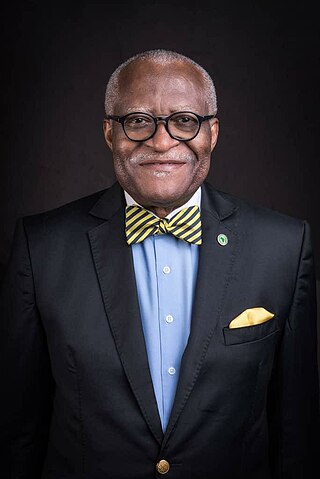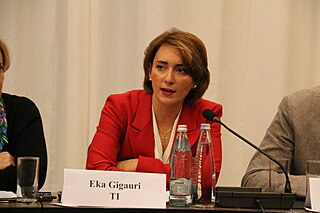Transparency International e.V. (TI) is a German registered association founded in 1993 by former employees of the World Bank. Based in Berlin, its nonprofit and non-governmental purpose is to take action to combat global corruption with civil societal anti-corruption measures and to prevent criminal activities arising from corruption. Its most notable publications include the Global Corruption Barometer and the Corruption Perceptions Index. Transparency International serves as an umbrella organization. From 1993 to today, its membership has grown from a few individuals to more than 100 national chapters, which engage in fighting perceived corruption in their home countries. TI is a member of G20 Think Tanks, UNESCO Consultative Status, United Nations Global Compact, Sustainable Development Solutions Network and shares the goals of peace, justice, strong institutions and partnerships of the United Nations Sustainable Development Group (UNSDG). TI is a social partner of Global Alliance in Management Education. TI confirmed the dis-accreditation of the national chapter of United States of America in 2017.

Herta Däubler-Gmelin is a German lawyer, academic and politician of the Social Democratic Party. She served as Federal Minister of Justice from 1998 to 2002, and as a Member of the Bundestag from 1972 to 2009. She currently teaches as an honorary professor of political science at the Free University of Berlin, particularly on international relations and human rights, and was the Hemmerle Professor at RWTH Aachen University in 2011. She is married to the legal scholar Wolfgang Däubler.

The Commonwealth Scientific and Industrial Research Organisation (CSIRO) is an Australian Government agency responsible for scientific research.

The Extractive Industries Transparency Initiative (EITI) is a global standard for the good governance of oil, gas and mineral resources. It seeks to address the key governance issues in the extractive sectors.

The Corruption Perceptions Index (CPI) is an index which ranks countries "by their perceived levels of public sector corruption, as determined by expert assessments and opinion surveys." The CPI generally defines corruption as an "abuse of entrusted power for private gain". The index is published annually by the non-governmental organisation Transparency International since 1995.

Peter Eigen is a lawyer, development economist and civil society leader.

In Argentina, the most important law enforcement organization is the Argentine Federal Police with jurisdiction in all Argentine territory. Most routine police work is carried out by provincial/state police forces. In recent years, several cities started their own local police forces to reduce the burden on the State Police. The capital city of Buenos Aires, where the Argentine Federal Police works with Argentine Naval Prefecture and Buenos Aires City Police.

Corruption in Armenia has decreased significantly in modern times, but remains an ongoing problem in the country. Despite this, fighting corruption following the 2018 Armenian revolution has recorded significant progress. Armenia is a member of the Council of Europe's Group of States Against Corruption (GRECO) and the OECD's Anti-Corruption Network and Armenia's anti-corruption measures are regularly evaluated within their monitoring mechanisms.

Corruption in Pakistan is widespread, and extends to every sector from government to judiciary, police, health services, education, and military.
The Organized Crime and Corruption Reporting Project (OCCRP) is a global network of investigative journalists with staff on six continents. It was founded in 2006 and specializes in organized crime and corruption.
The International Anti-Corruption Conference (IACC) is a series of international conferences organised by the IACC Council, in association with local governments and organisations, with Transparency International as its secretariat. The conference was first held in 1983 in Washington D.C.,and the New York City Department of Investigation and has since been held every two years in a different country.

Corruption in Poland is below the world average but not insignificant. Within Poland, surveys of Polish citizens reveal that it is perceived to be a major problem.

Corruption is endemic at every level of Liberian society, making Liberia one of the most politically corrupt nations in the world. As such, corruption is not specifically a punishable crime under Liberian law, which further exacerbates the nature of corruption present in the country. When President Sirleaf took office in 2006, she announced that corruption was “the major public enemy.”

Akere Tabeng Muna is a Cameroonian lawyer who is currently a member of the African Union High Level Panel on Illicit Financial Flows from Africa, chaired by H.E. Thabo Mbeki, and Co-Chair of the Common African Position on Asset Recovery (CAPAR). He was formerly the Chairman of the International Anti-Corruption Conference Council and Sanctions Commissioner of the African Development Bank Group. He has also served as the Vice-Chair of Transparency International and presided over the Economic, Social and Cultural Council (ECOSOCC) of the African Union, the Pan African Lawyers Union and the Cameroon Bar Association.

Eka Gigauri is a public figure and a civic activist who has served as the Executive Director of Transparency International Georgia, the national chapter of the global Transparency International anti-corruption movement, since December 21, 2010. In 2019 Eka Gigauri was elected as a board member of Transparency International Global movement and in 2021 she was reelected as a board member for a three-year term. In July 2022, Eka Gigauri was elected as a member of OGP Steering Committee for a three-year term.
Cobus de Swardt is a South African sociologist. He was head of Transparency International from 2007 to 2017, and is a former chair of the World Economic Forum (WEF) Global Agenda Council on Corruption.
An integrity pact is a multi-party agreement by a public body seeking to procure goods and services of significant value. As a tool for preventing corruption in public contracting, companies interested in bidding to supply the goods and services give a third party organisation, such as a civil society organisation, a role in monitoring compliance with the pact.
Transparency Serbia is a non-profit organization based in Belgrade, Serbia. It was founded in 2002 and granted the status of "national chapter in formation" by the Transparency International (TI) movement. Over the next four years, Transparency Serbia concentrated its efforts on advocating for the adoption and improvement of anti-corruption legislation through the use of promotional campaigns, draft amendments, comparative legal analysis of legislation. Transparency Serbia further worked to raise public awareness of anti-corruption legislation and identify implementation gaps where legislation was not being enforced. The priorities of work in that period were advocating for the adoption of the Law on Free Access to Information of Public Importance (2004), the Law on Prevention of Conflict of Interest (2004), full implementation of the Law on Financing of Political Parties (2003) and the Law on Public Procurement (2002), as well as the adoption of the National Anti-corruption Strategy (2005) and the accompanying action plan (2006).

The Corruption Investigation Office for High-ranking Officials, or CIO in short, is an independent agency of the South Korean government responsible for prosecuting crimes and investigating allegations involving "high-ranking officials" or their direct family members.
On April 17, 2021, Rozina Islam, a senior female reporter of the Bangladeshi daily Prothom Alo, went to the Health Ministry office in the Bangladesh Secretariat for COVID-19 related reporting. She was confined in the ministry for five hours and her cell phones were seized. She was allegedly harassed and assaulted during her detention at the secretariat. She was then arrested from the Ministry for alleged theft and taking photographs of sensitive state documents. Sibbir Ahmed Osmani, Deputy Secretary of the Health Services Division, filed a case against her around midnight of April 17, 2021 with Shahbagh police station under the Official Secrets Act. She was jailed in Dhaka Kashimpur Women's Central Jail amid widespread protests. A virtual hearing for her bail was held on May 20, 2021, later the court announced the decision would be delayed to May 23, 2021, and on that day she was granted a conditional bail after being imprisoned for 7 days.













